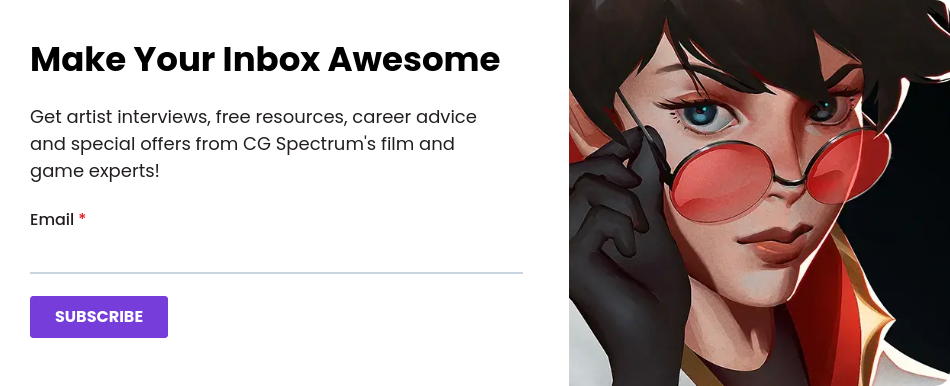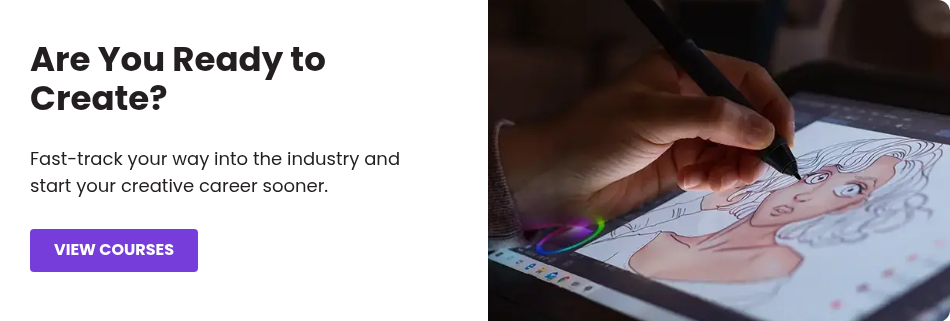Meet our new Game Design Technical Assistants, Alexios Vasilakis and Vincent Velarde.
They have joined fellow TA Heinrich Bisschoff to support CG Spectrum's game development students throughout their studies, provide inspiration, and ensure they get the very most out of their time here!
We chatted with Alexios and Vincent about what it's like to study study game design at CG Spectrum, what cool projects they are working on, and their future career aspirations. (In fact, soon after this interview, Alexios scored a part-time role as a Level Designer for an indie studio—congrats, Alexios!)
Hi Alexios and Vincent! Tell us about your journey into game development and design—what led you to study at CG Spectrum?
AV: I can remember “deconstructing” games and their systems/mechanics since primary school. My first try on game development and design was a few years ago when I tackled a turn-based RPG project using Unity. Then after a couple of years of designing escape rooms, I decided to get back to game design, but this time more professionally. After a thorough search and reviewing my options, I decided to join CG Spectrum which stood out from the rest overall.

Still from The Traveler, Alexio's FPS project as part of CG Spectrum's Game Design Course. (Using basic assets from Unreal Engine.)
 VV: I’ve always loved games for their interactivity and for allowing me to take part in fantastical worlds. Recently, I’ve come to really appreciate the moment-to-moment gameplay that makes a game, especially when it comes to hardcore shooters like Destiny 2 and DOOM Eternal. I enjoy deep mechanics and engaging gameplay — essentially games that make me think about what I’m doing and punish me for not executing it properly. To me, it is very satisfying to master a game’s mechanics.
VV: I’ve always loved games for their interactivity and for allowing me to take part in fantastical worlds. Recently, I’ve come to really appreciate the moment-to-moment gameplay that makes a game, especially when it comes to hardcore shooters like Destiny 2 and DOOM Eternal. I enjoy deep mechanics and engaging gameplay — essentially games that make me think about what I’m doing and punish me for not executing it properly. To me, it is very satisfying to master a game’s mechanics.
Around the start of the pandemic, my place of work at the time had shut down, and, while I didn’t lose my job, I went from over 40 hours a week to 0 overnight. I decided to try and learn Unreal Engine and build a working prototype of a first-person shooter role-playing game based on a short story I wrote a while back.

Still from Vincent's project, Half-Life: Alyx level built using Valve Hammer's gameplay and assets
I ended up trying to learn modeling and rigging for player arms as well as designing sci-fi weapons on paper, adapting the 2D drawings into 3D models, and animating them in tandem with the player arms. I didn’t know what I was getting into and, while not entirely unenjoyable, I realized building this project to the quality that I wanted was unrealistic by myself — at least in any reasonable amount of time for a solo developer!
I also wasn’t making too much progress on my own even with the many tutorials I studied on Unreal Engine and Blender. CG Spectrum seemed to be the best option in terms of streamlined education and developing my skills.
Can you walk us briefly through your creative process and what inspires you?
VV: I tend to be inspired by games that are ambitious and unique. I’ll look at a game like DOOM Eternal and deconstruct the AI and gameplay as I attempt to create something similar. Along the way, I’ll usually add more and more complexity and interactivity to a given scenario.
It’s easy to fall into the trap of feature creep, but, in my case, when experimenting with gameplay it’s more a matter of fine-tuning the features I’d like to include and nailing down their place in the scenario. For example, if I give an AI character an over shield, how can I give the player a way to disable or bypass that shield in a manner that’s interesting and fun and that adds to the gameplay without overcomplicating it? So, I’ll add a second AI that orbits the first AI and powers the shield. One method of bypassing the shield is to eliminate the second AI floating around. Now, what if that second AI is cloaked or only damageable in a small window when the first AI uses a power attack?

Screenshot showcasing Vincent's AI project: a study in FPS combat and complex AI, built using Unreal Engine 4 and assets from Unreal Engine Marketplace
DOOM Eternal doesn’t just have one solution to every problem, that would be incredibly boring and limiting. Rather, that game is deep and varied enough to give each weapon and mod in your arsenal a unique advantage over certain enemies at certain distances at certain moments, and all of that changes in the blink of an eye!
Of course, I don’t want to directly copy DOOM, but as I’ve come to understand the ins and outs of why the gameplay keeps people coming back for more, I continue to be inspired to create similarly intricate and enjoyable games.
AV: My creative process is pretty much like salads: I throw everything in there and mix it!
Just kidding, I like to take some notes first, usually on a notepad or Google doc. Then I usually go freestyle and tap into my imagination to fill in the gaps. What inspires me is the success stories of small indie companies.
How did you find CG Spectrum and what has your experience been like so far?
AV: As I mentioned above, a thorough search on the web. I can say that my experience has exceeded my expectations. I love the mentor program as a thing, it can be really helpful and all the mentors I’ve come across until now are giving it their all. But that’s not all.
The community is amazing. People are passionate about what they study and do and that works like a hype-wave that pulls you along with it. It’s a great study and work environment! - AV
VV: After trying my hand at creating a game on my own for a while, I came to the conclusion that if I really wanted to design and develop games professionally I’d need some proper guidance.
I looked around at local and distant universities and colleges, but everything I ran into felt like their generic “game development” courses were an afterthought. Just about everyone teaching these courses primarily taught other subjects and didn’t really have much experience gaming much less creating games. Not that they were completely unqualified, but I was less than impressed with the approach and even attitude towards creating games.
I discovered CG Spectrum while searching for colleges with game design or development of some sort and just about every aspect of other colleges that had me skeptical about more traditional paths seemed to be taken care of.
I’m nearing the end of my game design course and I can say with full confidence that CG Spectrum has exceeded my expectations in terms of quality of learning, support, and continued guidance from mentors and peers. -VV
Working directly with a mentor who is currently working in the industry was a no-brainer when compared to other teachers who were not nearly as experienced in game development.
I also greatly appreciated CG Spectrum’s flexible approach to individualized learning. For example, the game development courses don't teach Hammer specifically, they focus primarily on Unreal Engine 4, and soon 5 — but there is a lot of flexibility on what tools you want to use, what projects you want to make, and setting yourself up for success outside of CGS, whether that be indie work, AAA work, or somewhere in between.
So, my experience with CGS is very unique and personalized, and I think that really speaks to the draw of the school as a whole and the quality of the tailored learning experience students are offered.
Can you share your favorite piece of work right now and tell us a bit about it?
VV: I just completed the first version of my Half-Life: Alyx level “What’s In The Box?”. The name of the level comes from an old short film that itself drew influence from Half-Life 2.
Demo of Half-Life: Alyx "What's in the Box?" custom level built by Vincent using Valve Hammer
I wanted to try my hand at creating an interesting and engaging level from beginning to end using high-quality gameplay and assets. - VV
Having created many other projects in Unreal Engine — some small and some absolutely more than I could handle — I wanted to focus more on my ability to create interesting gameplay that has been tried and tested rather than spending most of my time getting an AI to work properly or creating the specific player mobility that I wanted and other such roadblocks. That still is very valuable to build yourself, but it is very time-consuming and this late into my course with CG Spectrum I really wanted to get more projects on my portfolio.
Overall, I think it took me around two months to learn Hammer (Valve’s map editor for Source 2), at least enough to get a playable level working and build the level. I tried to create unique scenarios and use what Valve had made in creative ways. For example, I had the player fighting multiple enemies while avoiding Jeff (the blind zombie) whereas, in the chapter with Jeff in the campaign, the blind zombie was really your only threat. Jeff is better suited to the way Valve used him, but I believe my use of Jeff succeeded in creating a combat scenario that was much more tense and exciting.

AV: So, I’m currently working on a Soulslike FPS (first-person shooter) for my courses in CG Spectrum. It’s pretty obvious where my inspiration comes from :p.
It’s still a work in progress, so I don’t have much to share at the moment. I will upload a gameplay of the level block-out I am making soon, in the game design channel [on Slack].
What does your role as a Game Design Technical Assistant involve, and what do you most enjoy about it?
AV: Being a TA involves helping students whenever they have questions or are facing issues, aiding mentors or other CGS members, and also organizing and planning events/happenings for our channels.
Having been a private tutor for several years, I plain like teaching. Passing on the torch of knowledge is a wonderful way to channel positive energy. As for game development specifically, we’ve all been in that state of despair, skipping through tutorials trying to find solutions. It’s nice when someone can give you a hand and get you out of that tight spot. I try my best to play that part.

WIP from Alexios using Unreal Engine. His current focus is getting the systems and mechanics right.
VV: My role varies from helping students troubleshoot technical problems in unreal and the CGS framework, creating and hosting challenges to help sharpen their skills, arranging interviews with mentors and other industry veterans, providing meaningful feedback on student work, and generally pointing students in the right direction.
I enjoy seeing the work of other students and helping them overcome roadblocks that I myself have struggled through. I aim to make these roadblocks less frustrating and time-consuming.
Tell us about the challenges you will be running for students. How are these designed to help students improve as game designers?
AV: I personally like challenges that present realistic scenarios, ones that make students get out of their comfort zone and think outside the box. That’s part of our job at the end of the day!
Game design and game development, especially when you’re in the process of learning, can get you into a routine and cut you out from social activities. Challenges and participating in the channels can help even things out.
VV: The challenges are intended to help students solidify what they’re already learning by presenting real-world scenarios with limitations in a small, but reasonable, timeframe. The challenges themselves usually consist of creating a pitch deck, small-scale worldbuilding, creating a level design document with an accompanying 2D map, and more.
I personally like the level design challenges since I get to test myself in creating the objectives, story, adding additional gameplay mechanics (if I’m designing a level for a pre-existing game), and including many opportunities for players to make immediate and far-reaching decisions both in narrative and gameplay. These challenges are a great way for me to experiment.
Game retrospective for Vincent's project, Proteus — a combination of level and game design — made in Unreal Engine 4. Vincent built the AI behavior, shooting mechanics, dialogue system, and a few other mechanics.
What do you think makes the CG Spectrum community so special? How can students make the most out of it?
AV: What’s special about this community is that everyone participates. Students, mentors, alumni: they all play an important role in this. Everyone is friendly and willing to share valuable information with each other.
I think the best thing a student can do is ask questions. Reach out to their mentors or the TAs, share their progress in the channels and participate in the challenges. - AV
Connecting with people is a vital part of our jobs and this is a ‘secure’ environment for everyone to start training that skill.
VV: No one here wants to see you fail. That’s not unique to CG Spectrum, but the approach to helping students grow and succeed in their craft is unparalleled.
Being able to talk in-depth with mentors who are currently working in the industry is incredibly helpful in and of itself. That paired with a very active community of students who encourage and often work with each other makes for an excellent learning and social environment. CG Spectrum really is about equipping people to make high-quality art and celebrating that art with other creative and talented individuals.
What creative strengths have CG Spectrum helped you with the most?
AV: It’s helped me learn how to organize my work in a more proper and professional way. It also sets some good grounds for socializing.
VV: CG Spectrum has helped me become more intentional about what I create. I’ve narrowed down what I like to play and what I like to make. A lot of my earlier projects were experimental both in terms of what I thought I was capable of creating and the experiences I wanted to create for players.

Another still from Alexio's project, The Traveler in Unreal Engine.
Where is your own career headed? Where can we learn more about you and see your work?
AV: I have several months left in CGS courses. During that time I’d like to refine some of my weaker skills, like level design, in which I don’t have as much experience. Then I’d like to work as a systems designer on some project.
I’m currently part of a team project, which I can’t say much about and I’m also, slowly, making a visual novel for android, in collaboration with a few CGS students. LinkedIn would be the best place to learn about stuff I currently do or will work on.
VV: I won’t be at CG Spectrum as a student for much longer, but I’ll still be around as a TA for a little while. I’ve been building up my technical skills and creating projects that would be appealing to AAA studios looking for a junior-level designer and associate gameplay designer role.
I’d like to end up working long-term with studios like id Software and Bungie. It will likely take a lot more time and experience to reach that level, but that’s my goal. I touch up my portfolio every now and again, it’s definitely the place to go to see what I’ve been working on and my LinkedIn is a good way to connect.
Do you have any advice for current and potential students who might be interested in our game development courses?
VV: Participating in challenges and being active in the slack channels for game design/development is a great way to build your skills, maybe even add to your portfolio outside of your regular assignments, and connect with people.
Share your work and not just the finished product. Asking for specific feedback and making adjustments to your projects based on outside feedback will go a long way in helping you make each project the best that it can be. - VV
AV: Do the extra coursework, it’s always worth it. Participate in the channels and connect with people. And finally, download a game engine and start experimenting.
Want to join an inspiring and supportive community of creators?
One of the benefits of studying at CG Spectrum is becoming part of a vibrant and supportive community of TAs (like Alexios, Heinrich, and Vincent) and mentors whose goal is to help students grow and develop their skills.
If you want a career in video games, consider one of CG Spectrum's game development courses. We offer students a personalized online learning experience led by experts with years of industry experience, along with tailored career development assistance — so, you'll not only learn the skills studios are hiring for but you'll also know how to apply confidently for the job!

Related Links
- Game development career pathways
- Game design courses
- Game programming courses
- Expert Panel: The Future of Games




